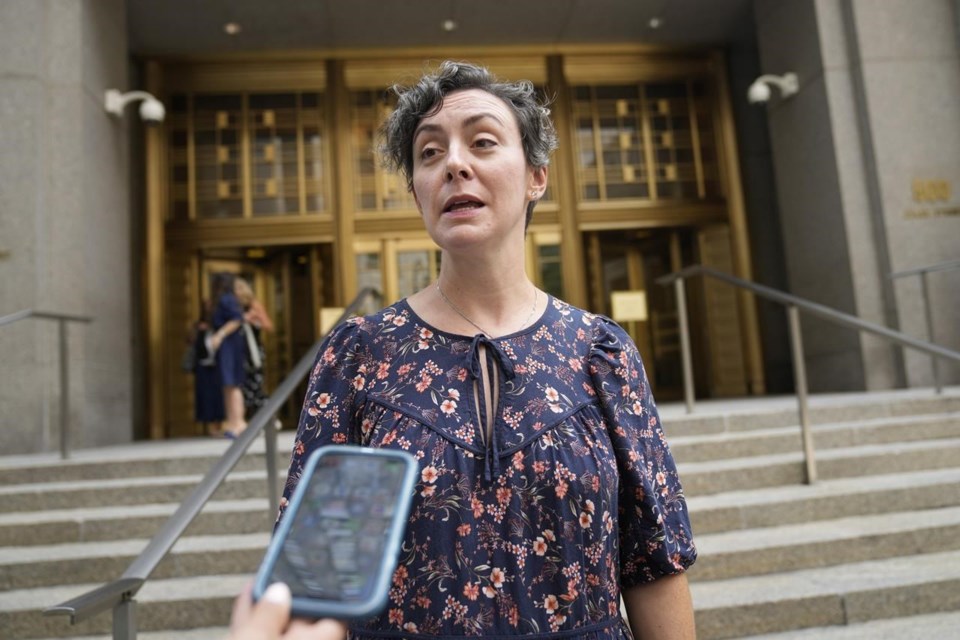NEW YORK (AP) — A gynecologist who sexually abused vulnerable and trusting patients for over two decades at prestigious New York hospitals cried before he was sentenced Tuesday to 20 years in prison by a federal judge who called his crimes unprecedented.
The sentence for Robert Hadden, 64, was a measure of vindication for hundreds of former patients who accused the doctor of molesting them during examinations but saw an earlier prosecution end with a plea bargain that spared him from jail.
Given his chance to speak Tuesday, Hadden stood, his hands folded before him, as he said there was “much I’d like to say” but that he had been advised by lawyers to keep his statement brief.
“I’m very sorry for all the pain that I have caused,” the sobbing Hadden said before dropping his head down as he sat again. He then took off his glasses and wiped tears from his eyes.
In statements over the past two days, Judge Richard M. Berman said the case was like none he’d seen before and involved “outrageous, horrific, beyond extraordinary, depraved sexual abuse.” He noted that at least 245 women Hadden treated said they were abused.
The federal trial involved a smaller number of victims. Hadden was convicted of four counts of enticing women to cross state lines so he could sexually abuse them.
Nine victims testified at the trial, describing how Hadden molested them during gynecology treatments, starting in the late 1980s, at prominent hospitals, including Columbia University Irving Medical Center and NewYork-Presbyterian Hospital. The Associated Press does not typically name victims of sexual assault unless they come forward publicly.
Allegations of misconduct during examinations first surfaced in 2012. Hadden was indicted on state charges in 2014 as women — 19 and counting — kept coming forward. But in 2016, the office of the Manhattan district attorney at the time, Cyrus Vance Jr., allowed Hadden to plead guilty to two low-level felonies and a misdemeanor in a deal that required him to give up his medical license but didn't require jail time and kept him out of the state's sex offender registry.
Some of the women who had gone to state prosecutors were outraged, but their stories didn't start receiving public attention until the #MeToo movement began gaining steam in 2017.
Federal prosecutors in Manhattan got a grand jury indictment against Hadden in 2020, charges based on the fact that some patients at his New York offices had come into the city from other states. He was convicted in January.
Several dozen of Hadden's accusers were in the courtroom for his sentencing and some of them spoke outside the courthouse afterward, sharing their emotions with reporters and one another. Among them was Liz Hall, who said she found Hadden's expression of regret hollow.
“That was not an apology. He has shown zero remorse or empathy. I think he’s incapable,” she said.
Hall said she hoped the sentence would give other victims of sexual abuse courage to speak out.
Some of the women abused by Hadden later pushed for a change to New York law that made it easier for survivors of sexual abuse to sue over allegations normally barred by the statute of limitations. Hospitals where Hadden worked have agreed to pay more than $236 million to settle civil claims by more than 200 former patients.
According to trial testimony, Hadden benefited from the prestige of the hospitals where he worked as he groomed his patients in a private office decorated with pictures of his children as he conversed with them about their personal lives.
But once he had isolated them after a chaperone or nurse left the treatment room, he fondled and probed them with gloveless fingers and sometimes orally.
The judge noted that many patients were particularly vulnerable because they were pregnant, had physical problems, or had never been to another gynecologist and trusted that Hadden was behaving properly. Assistant U.S. Attorney Jane Kim said Tuesday that Hadden still had not accepted responsibility for his crimes.
Outside the court, Dian Monson described writing a long letter to Columbia in early 1994 detailing abuse she suffered during an appointment with Hadden the previous year. She said Columbia responded with a letter and an official promised to ask Hadden about it and get back to her, but never did.
Over two decades later, Monson saw a television report in which abuse similar to what she endured was described by Evelyn Yang, whose husband Andrew Yang ran for president in 2020 and New York City mayor in 2022. Yang said Hadden sexually assaulted her years ago when she was seven months pregnant. She also said Columbia had denied knowing about Hadden’s abuse until 2012.
Monson said she recalled her 1994 complaint to Columbia and the hospital’s response, and thought: “That’s a total lie and I have the evidence that will prove that’s a total lie.”
Hall praised her, saying: “I honestly think you are the only reason ... Columbia was forced to take accountability.”
Monson smiled but only agreed to an extent, saying: “I kind of caught him. We all kind of caught him.”
Larry Neumeister, The Associated Press


